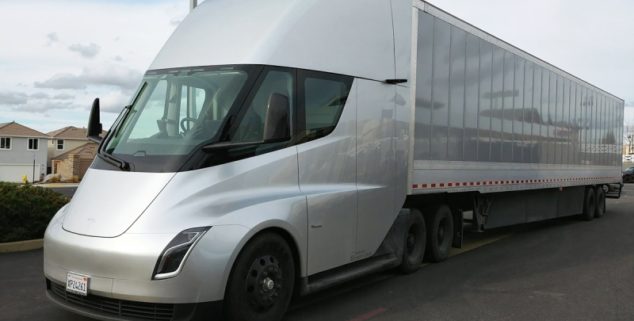News
Note to industry: Electric trucks save lives
 An electric big-rig tractor-trailer truck. (Photo: Union of Concerned Scientists)
An electric big-rig tractor-trailer truck. (Photo: Union of Concerned Scientists)Polluters never miss an opportunity to exploit a crisis for financial gain — and the coronavirus crisis is no exception.
As millions of Americans hunker down in their homes, sacrificing their incomes to save lives, truck manufacturers are endangering people in my community by lobbying for delays to the nation’s first electric truck standard, which would slash toxic air pollution from trucks.
My family lives in the Inland Empire, a region that is known as America’s online shopping cart. Warehouses line our streets, attracting thousands of heavy-duty trucks like wasps to a nest. Because of this traffic, communities like mine are known as “diesel death zones.”
In the midst of this global pandemic, the dangers of breathing some of the worst air in the nation are even more pronounced.
While the rest of the nation is experiencing record clean air, the air we’re breathing is more polluted than ever. That is because the delivery economy has kicked into high gear with online orders of both essential and non-essential items.
Even before COVID-19, our communities were at a greater risk of developing respiratory diseases that could cut our lives short.
Now, in the midst of this global pandemic, the dangers of breathing some of the worst air in the nation are even more pronounced. New research from Harvard shows that people who have lived for decades in areas with high levels of soot in the air are 15% more likely to die from coronavirus than people living in lower-pollution areas. In California, diesel trucks are the number one source of this pollutant.
Historic marginalization and inequality means that the burden of toxic air quality falls disproportionately on communities of color — like mine. Exposure to polluted air may be one of the reasons why this pandemic is hitting these same communities of color especially hard.
Electrifying heavy-duty trucks is the best way to improve air quality in our neighborhoods and save lives. Thankfully, the California Air Resources Board (CARB) took a step in the right direction by strengthening the proposed electric truck standard that is now in the sights of manufacturer lobbyists.
These are the same manufacturers that have always been fighting for a weaker standard and a slower process. For them, the economic fallout from the pandemic is serendipitous – an easy out from essential public health standards.
But the fact is that the standard will not go into effect for years – giving these companies ample time to prepare. And orders for electric trucks that came in before COVID-19 already exceed the number of trucks manufacturers would have to produce in the first year. In other words – there is no good reason to slow down, and doing so would only hurt our communities more.
More than ever, this crisis makes clear that we all deserve to breathe clean air and to have strong, healthy lungs. Especially our children – like my niece, who already struggles to breathe and needs an inhaler to play outside. And our elders, many of whom suffer from blood pressure and chronic breathing illnesses, and work two to three jobs just to make ends meet.
Families like mine are anxious to move on, not just from this crisis, but to a better future. It’s up to our state leaders to stand strong against polluter pressure and help us breathe easier.
—
Editor’s Note: Allen Hernandez is the executive director at the Center for Community Action and Environmental Justice (CCAEJ) and lives in the City of Fontana. Before that, he was an organizing representative with the Sierra Club and union organizer with UNITE HERE Local 11.
Want to see more stories like this? Sign up for The Roundup, the free daily newsletter about California politics from the editors of Capitol Weekly. Stay up to date on the news you need to know.
Sign up below, then look for a confirmation email in your inbox.

Leave a Reply